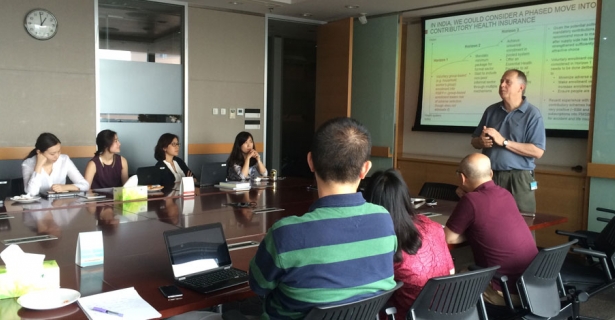Now in the second half of my internship with the Gates Foundation office in Beijing, I’ve been delving deeper into my work with the UN initiative Every Woman Every Child (EWEC). I had been researching the background information on the initiative for a concept note, looking at the reporting mechanisms, the funding facilities, how everyone in the world can be a stakeholder in the future of maternal, adolescent, and child health. Since then, our team within the Foundation’s Policy & Advocacy Group began interviewing local experts from top Chinese universities, such as Peking and Tsinghua, on Chinese health expertise and speaking with UN representatives to discuss capabilities and priorities.
I currently support the team with research on the Chinese health experience and the challenges related to EWEC outcomes in Nigeria, Ethiopia, and Kenya. The aim of my research is to inform ways that China and these three countries can collaborate, Benefiting from where China has had successful health outcomes.
My work day goes by quickly – there are both exciting and complicated aspects to the story of global development. For instance, China has done amazingly well in reducing maternal and child mortality. Hospital delivery in the country doubled from 1990 to 2015. This country is amazing in its capacity to build and grow. It is relentless, demanding, hardworking. However, even though our team is now preparing to see the ways that China can assist other countries in reducing their own mortality rates, I still hesitate in eagerly advocating for such mentorship. It is easy to fall back on a statistic and say that development was achieved. The disparity in hospital services between urban and rural China is still astonishing. Like many of their counterparts in under-resourced regions in Nigeria, for example, some rural Chinese villages don’t have easily accessible clinics. Sometimes, it is easier to try and face another place’s “problems” than to deal with your own a great article on that.
Moreover, our group has yet to interview any African health experts. One of my team members brought that up right away and mentioned that she didn’t want to proceed to strategy until we connect with such experts. I feel lucky to be in a workplace that holds such values.
In addition to EWEC, I’ve also started researching the Chinese education landscape for a possible new focus in our office. The Gates Foundation primarily focuses on global health (and that’s what our office mainly tackles), with one education program in the US. However, the China office is beginning to look into the possibility of bringing that focus here. This project in particular feels exciting, because this is my area of interest within global development. The question of equitable education worldwide feels like the most interesting question to me – challenging because it’s culturally subjective. But, it’s also a building block for many other indicators of well-being.
In other happenings around the office, we had a visitor from the Policy & Advocacy team in Seattle (the foundation’s HQ) join us for a day to tell us about their health programs in India. The picture attached is that of our lunch keynote session. Our visitor explained the thinking behind the foundation’s proposal to the Indian government in healthcare reform. The biggest thing I took away from that keynote was the undeniable importance of numbers. As important as the qualitative information is, the numbers in development are oftentimes the evidence to fund a program. During his presentation, our keynote speaker put me and my colleagues on the spot, asking us questions, such as what percentage of our GDP was spent on healthcare, how much we would guess India’s quota to be, what percentage of people are even on health insurance, what was the public/private divide. I was so amazed at how my colleagues were able to gauge their answers, and speak in numbers like it was a second language. As someone who is just delving into the throes of development economics, this is definitely a skill to keep in mind.

